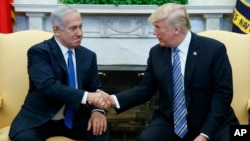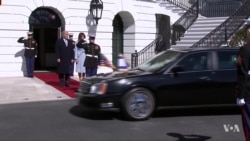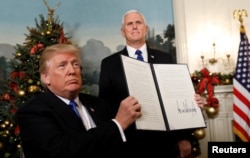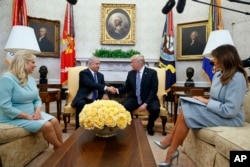“Iran must be stopped; that is our common challenge,” Israeli Prime Minister Benjamin Netanyahu told U.S. President Donald Trump at the White House on Monday.
The two leaders, sitting alongside each other in the Oval Office, discussed how to thwart Iran's military advances in the Middle East and the 2015 international accord designed to curb Tehran’s nuclear weapons development. Both Trump and Netanyahu have deemed it inadequate.
Trump has been unsuccessful in winning support from the pact's other signatories - Britain, France, Germany, the European Union, China and Russia - to renegotiate the deal.
WATCH: Stopping Iran
"Iran has not given up its nuclear ambitions" said Netanyahu, adding that Tehran "came out of this nuclear deal emboldened, enriched. It’s practicing aggression everywhere, including on our own borders"
The growing presence of Iranian forces in Syria to support President Bashar al-Assad is of particular concern for the Israeli leader, who has accused Tehran of seeking a permanent base in Syria.
Since the nuclear pact in 2015, Iran “has been able to strengthen everything they needed to strengthen, put every logistical and operational network in place to be able to get to this point where we are talking about inevitable war between Israel and Iran,” according to Hudson Institute adjunct fellow Michael Pregent.
“Iran is showing their true intentions with every increase in their capabilities, whether it be rocket systems or the ability to deploy militias from Iraq to Syria and into Lebanon if need be,” Pregent, a Middle East analyst and former U.S. intelligence officer, told VOA.
Trump, in his remarks, did not mention Iran by name but said the United States and Israel “are very, very close on military and terrorism and all of the things that we have to work together on. The relationship has never been better.”
Iran’s foreign minister on Monday told his visiting French counterpart the Europeans need to pressure Trump to comply with the nuclear deal.
Mohammad Javad Zarif, during the meeting with Jean-Yves Le Drian, also blamed the United States for stoking tensions “by turning our region into a gunpowder store by selling weapons,” according to the semi-official Fars news agency.
Jerusalem Embassy
During the Oval Office meeting Trump said he may travel to Jerusalem to open the U.S. embassy there, prior to the 70th anniversary of the State of Israel’s May 14, 1948 independence declaration.
"We're looking at coming" Trump replied to a question from a reporter. "If I can, I will."
Netanyahu effusively praised Trump for making the controversial decision to move the embassy from coastal Tel Aviv to the hilly ancient city which most countries consider disputed territory, subject to negotiations with the Palestinians.
“This was a historic proclamation followed by your bold decision,” said Netanyahu, noting, “The Jewish people have a long memory” and Trump’s action to move the embassy “will be remembered by our people throughout the ages.”
Mideast peace
The U.S. president expressed optimism about the chance for a Middle East peace deal.
“It would be a great achievement -- and even from a humanitarian standpoint -- what better if we could make peace between Israel and the Palestinians?" He added, “And I can tell you, we are working very hard on doing that.”
The president said he thinks the Palestinians want to come back to the table, but, “if they don’t, you don’t have peace” he added, noting that any breakthrough to reach what he called “the hardest deal” would come after “years and years of opposition and, frankly, hatred.”
Trump's senior adviser and son-in-law Jared Kushner, whose security clearance has been downgraded, is still leading the administration's effort to bring peace to the Middle East, according to the White House.
At the daily press briefing Monday, White House Press Secretary Sarah Huckabee Sanders was asked whether Kushner's downgraded security clearance had any effect on his role in that process.
“None at all that I am aware of, Huckabee Sanders replied. “His role wasn’t impacted today.”
Kushner is a strong supporter of Israel, and Netanyahu is a longtime friend of the Kushner family.
Trump spoke to a small media group before the two leaders met on Monday. Reporters, however, did not have an opportunity to formally question Trump and Netanyahu, as no joint news conference was scheduled, unlike when the two met at the White House in February of last year.
Corruption investigation
This trip by Netanyahu is somewhat of a respite from his troubles at home, where he faces a string of corruption investigations.
Israel’s justice ministry announced Monday that the prime minister’s former spokesman signed a state’s witness deal in one of the corruption cases swirling around Netanyahu.
Israeli investigators questioned the prime minister and his wife, Sara, for hours Friday in one of the probes.
In two of the cases, police have recommended that Netanyahu be charged with bribery, fraud and breach of trust.
There is speculation that the Israeli leader could call a snap election to attempt to renew the mandate for his Likud party and as a way to delay the legal proceedings against him.
Netanyahu has denied wrongdoing, calling the allegations a “witch hunt” and "fake news," the same terms Trump often employs to describe the investigations into allegations his campaign colluded with Russia to help him win the 2016 U.S. presidential election.









